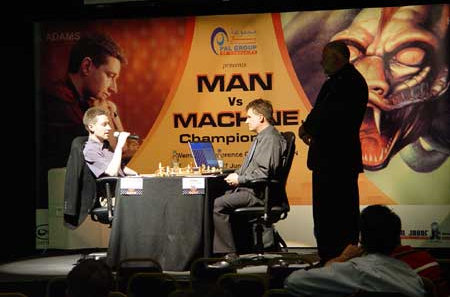 British chess grand master Michael Adams interviewed after losing a match to the 32-processor hardware-enhanced Hydra chess machine. In six games at regular time controls, Adams was able to tie only once, losing the other five to the machine.
British chess grand master Michael Adams interviewed after losing a match to the 32-processor hardware-enhanced Hydra chess machine. In six games at regular time controls, Adams was able to tie only once, losing the other five to the machine.Source: ChessBase News.
Read "We've Made Our Match" by William Saletan, The Washington Post, May 13, 2007.
The article by the Slate science and technology reporter says that chess programs have become sufficiently powerful that the best of them regularly win matches against human grand masters. The humans for a while were able to retain superiority by using anti-machine strategies developed to exploit weaknesses in the programs. However, programmers devised anti-anti-machine strategies to again surpass the humans.
Essentially, the software has been developed to include more and more sophisticated heuristics. The speed and power of the computer processing enables the computer to explore more alternatives and to explore them more fully than the human can do. Human experts apparently discard lines of play from consideration, judging that they do not look promising, that the computers exploit. Of course, these are very powerful computers, with very powerful software.
In the distant past, computer chess was fun for programmers, and served to explore the application of heuristic programming to complex tasks, as well as to demonstrate that "human problem solving behavior" did not necessarily require humans.
Saletin is making the point that humans can develop computers and computer programs that can solve difficult analytic challenges under time constraints better than the best human analysts. He states:
In the big picture, whether the computer beats us isn't important. Either way, it's a human triumph. In fact, it's a greater human triumph when the computer wins. As a player, you can conceive a brilliant move without understanding where it came from. As a programmer, you have to do something much harder: articulate rules that will generate such brilliance.Comment: I agree with Saletin. Now we have to start developing computers and software that will help with really difficult policy issues. Would it not be great for future leaders to have the help of powerful machines as they try to avoid messes like that which has been created in Iraq, or which is being created in the global environment! How far fetched is that? Well, 50 years ago I don't think anyone really believed that the best chess player in the world would be a machine. JAD
No comments:
Post a Comment